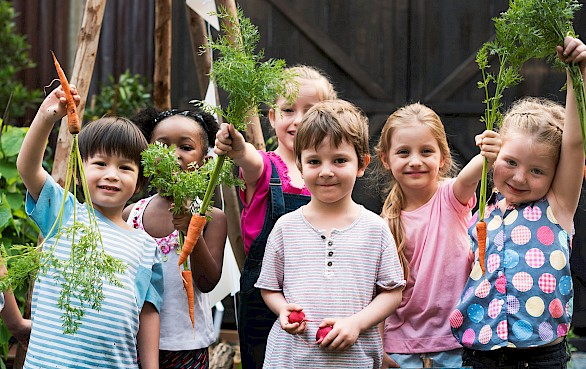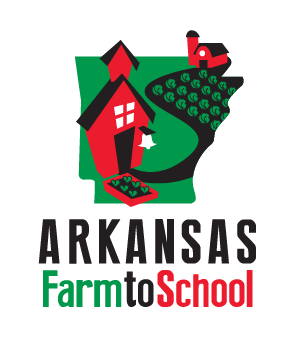Farm to School FAQ


Farm to school enriches the connection communities have with fresh, healthy food and local food producers by changing food purchasing and education practices at schools and early care and education sites. Students gain access to healthy, local foods and educational opportunities such as school gardens, cooking lessons, and farm field trips. Farm to school empowers children and their families to make informed food choices while strengthening the local economy and contributing to vibrant communities.
Since Farm to School’s inception, over 300 schools have implemented farm to school programs across the Natural State with more popping up every year. If you would like to participate in the cultivation of young minds and fresh produce, check out these frequently asked questions:
1) What is farm to school?
At the national level, the birth of the phrase “farm to school” can be traced back to the 1990s when pilot projects began in California and Florida to explore the possibility of transforming children’s relationship with food by exposing them to fresh, local food.
Farm to school implementation differs by location, but always includes one or more of the following:
- School Gardens: Students engage in hands-on learning through gardening and farming;
- Education: Students participate in education activities related to agriculture, food, health, or nutrition; and
- Procurement: Local foods are purchased, promoted, and served in the cafeteria or as a snack or taste test.
Every school focuses on a combination of these pillars to build a comprehensive farm to school program. Farm to school programs also have the added benefit of improving public health, supporting local communities, and providing access to healthy food for all. Students across the state engage in hands-on learning through the growing and tending of their crops, learn garden, nutrition, and cooking-based lessons, and eat locally grown food in meals and snacks. These opportunities encourage an appreciation of the local food system with young learners.

2) Who is involved?
There is a vast network of partners, administrators, educators, and students that participate in the larger Arkansas Farm to School community. More specifically, the Arkansas Farm to School Collaborative, a group of 12 state agencies and nonprofits, has been working to advance statewide farm to school initiatives since 2017.
Further, National Farm to School Network (NFSN) recognizes the Arkansas Department of Agriculture as the state’s Core Partner and the following as farm to school Supporting Partners:
- Arkansas Children’s Research Institute
- Arkansas Department of Education – Child Nutrition Unit
- Arkansas Department of Human Services
- University of Arkansas System Division of Agriculture Cooperative Extension Service
Lastly, through the passage of Act 506 in 2019, the Arkansas legislature established a Farm to School and Early Childhood Education Program and a position for a full-time Farm to School and Early Childhood Education Program Coordinator within the Arkansas Department of Agriculture.
To learn more about Arkansas Farm to School, check out the newly released Arkansas Farm to School 2020 Annual Report. The report details the status of farm to school in the state and provides an overview of farm to school leadership in the state.
3) What does the Farm to School and Early Childhood Education Program do?
The Farm to School and Early Childhood Education Program connects schools, local growers, and the community to food and farm educational experiences paired with healthy, locally grown food. It does this by providing equitable and just programming, resources, funding, and technical assistance to schools, farmers, and partners in the local food system. Sarah Lane, Mark Nelson, and Hanna Davis are the team leaders who make this mission possible.
Sarah Lane is the Farm to School and Early Childhood Education Program Coordinator and facilitates the Arkansas Farm to School Collaborative. Sarah also develops farm to school resources, leads training and webinars, and much more.
Mark Nelson serves as the Farm to School Innovation Lead, an AmeriCorps VISTA position, and spearheads research, development, and implementation of trial initiatives to help build the capacity of the farm to school program. Two of Mark’s upcoming projects include a farm to early care and education questionnaire and farm to school storytelling.
Hanna Davis, State School Garden Manager, leads the Arkansas Grown School Garden of the Year Contest and the Arkansas School Garden Grant Program. Hanna also provides assistance to all the school gardens in the state and has developed a state school garden map, with more resources coming soon.
4) How does farm to school work in Arkansas?

Every program in the state has a unique model that promotes a diverse and engaging experience for all students involved as the program encourages new ideas and implementation to sprout from their gardens. Some gardens are supplying supplemental lunch and snacks to their school cafeteria and classrooms while others are conducting experiments to promote crop yields and scientific discovery. When students are involved in the growing process they are more inclined to appreciate the health benefits of their hard work. That is why the benefits of farm to school include public health and education.
Farm to school extends beyond the garden, too. Seasoned farmers and gardeners often lend their experience and support to these local programs which help the students appreciate the agriculture industry. Farmers and producers join school garden committees, offer field trips, visit the school during lunch period, and share their love of growing food with the students. Many nonprofits and organizations provide innovative farm to school educational opportunities in Arkansas.
These organizations include:
- Apple Seeds, Inc.
- Arkansas Hunger Relief Alliance
- FoodCorps Arkansas
- Full Circle FarmCorps
- University of Arkansas System Division of Agriculture Cooperative Extension Service
Farm to school is an ideal vehicle to support the local economy by fostering close relationships between local growers and schools. For instance, 25% of Fayetteville School District’s food service program, Seed to Student, is spent directly with local farmers and local food businesses.
5) How did farm to school start in Arkansas?
Arkansas’s initial steps with farm to school occurred in the 1990s. In 1992, Dunbar Garden started next to Gibbs Magnet Elementary School and Dunbar Middle School in Little Rock as a nonprofit to provide educational resources and interactive opportunities for youth, families, and the community through sustainable urban agriculture. In 1995, several Arkansas producers participated with the New North Florida Cooperative Association, Inc. (NNFC) that worked with 60-100 Black farmers in five southern states to provide fresh produce to schools.
Progress with farm to school continued to build in Arkansas over the next decade. In 2005, Fayetteville School District became the first school district to develop a farm to school program to procure local products to serve its students. In 2007, Apple Seeds, Inc. was formed to inspire healthy living through garden-based education. The nonprofit established and supported school gardens at Fayetteville School District initially and expanded its programming over the years to include cooking classes, garden clubs, and field trips to farms and farmers markets.
In early 2009, the first meetings were held to formally discuss farm to school. Two were hosted by the Arkansas Department of Education’s Child Nutrition Unit, and Heifer International hosted the first Arkansas Farm to School Conference. These meetings resulted in the formation of the Arkansas Farm to School Steering Committee and a farm to school pilot program where locally grown food was supplied to 24 school districts around the state. The work of the steering committee was initially led by the Arkansas Food Policy Council.
In 2012, a Community Advisory Board for the Arkansas Grow Healthy Study that was led by Arkansas Children’s Research Institute (ACRI) was formed to advise on pilot farm to school projects around the state. In 2013, ACRI was chosen as the state’s Core Partner by the National Farm to School Network (NFSN) and assumed the state farm to school leadership role.

In 2013, Fayetteville School District became the first school district in Arkansas to receive a Farm to School grant from the U. S. Department of Agriculture. A total of $617,430 has been provided to seven Arkansas entities through the program since 2013.
In 2014, then-Governor Mike Beebe proclaimed October as Arkansas Farm to School Month. Governor Asa Hutchinson continued the practice in 2015 and each year since. A more detailed chronology of farm to school development can be found on the Arkansas Department of Agriculture’s website.
